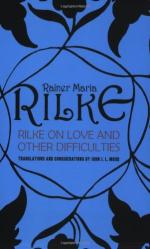
|
| Name: _________________________ | Period: ___________________ |
This test consists of 15 multiple choice questions and 5 short answer questions.
Multiple Choice Questions
1. Of what does Rilke write "that so strangely began with such a number of profound and grave transformation" in "Blood-Remembering"?
(a) Of lost loves.
(b) Of depressions.
(c) Of painful thoughts.
(d) Of childhood illnesses.
2. From what novel is the excerpt "Blood-Remembering" taken?
(a) Letters to a Young Poet.
(b) The Duino Elegies.
(c) Into the Looking Glass.
(d) The Notebooks of Malte Laurids Brigge.
3. Who does Mood quote in the Epilogue as having written, "A social order which draws a distinction between the wish and the deed, between the criminal and the righteous, is this a kingdom of darkness"?
(a) Matthew.
(b) Norman O. Brown.
(c) Samuel Beckett.
(d) Jesus Christ.
4. Rilke writes in "Blood-Remembering" that one must feel what?
(a) How the women weep.
(b) How the lights shine.
(c) How the sheep sigh.
(d) How the birds fly.
5. Mood writes that Rilke's novel is "dialectically" what?
(a) Depressing.
(b) Biographical.
(c) Surreal.
(d) Semi-autobiographical.
6. What has the fear of the inexplicable also impoverished, according to Rilke?
(a) Trust in God.
(b) Relationships with God.
(c) Relationships between human beings.
(d) Belief in self.
7. What does Mood write is the fallacy of expression theory in art?
(a) That art is full of feeling.
(b) That art "expresses feelings."
(c) That art creates feeling.
(d) That art is art for no reason.
8. What must "one know" in order to write a single verse?
(a) The animals.
(b) The women.
(c) The world.
(d) The rivers.
9. Mood writes in the introduction to "The Dragon-Princess," "Unambiguous affirmation is" what?
(a) Romantic.
(b) Truth.
(c) Sentimentality.
(d) Naive.
10. Who insisted on placing a large cross on a separate tombstone for Rilke?
(a) His grandson.
(b) His daughter.
(c) His wife.
(d) His son.
11. Who said, "You have heard that it was said to the men of old, 'You shall not kill; and whoever kills shall be liable to judgment.' But I say to you that every one who is angry with his brother shall be liable to judgment."
(a) Jesus Christ.
(b) Matthew.
(c) Luke.
(d) Samuel Beckett.
12. Of what does Rilke write is, "to have courage for the most strange, most singular, and the most inexplicable that we may encounter"?
(a) The singular obstacle in life.
(b) The only courage that is demanded of us.
(c) The only feeling we must feel.
(d) The single obstacle in love.
13. What does Rilke write "that rushed along on high and flew with all the stars"?
(a) Days of wandering.
(b) Kisses of beauty.
(c) Nights of travel.
(d) Childbirth.
14. How much earlier than his death did Rilke pen his epitaph?
(a) Three years.
(b) Fifteen months.
(c) Two months.
(d) One month.
15. From which of Rilke's poems does Mood quote "The Difficulty of Dying," "the glance while, as though caught by a whirlpool's / circling, swims a little while"?
(a) "Greek Love-Talk."
(b) "Dying Rose."
(c) "The Rose Window."
(d) "The Lovers."
Short Answer Questions
1. From what comes the line, "Killing is a form of our wandering mourning"?
2. Rilke suggests to the reader in "The Dragon-Princess," "we must assume our existence as _____ as we in any way can."
3. What does Rilke begin with in his discussion of "The Dragon-Princess"?
4. Where does Rilke suggest a person might be removed from his room and placed, in discussing a metaphor for solitude?
5. Mood writes that the affirmative tone of "The Dragon-Princess" comes from its ambiguity and what?
|
This section contains 546 words (approx. 2 pages at 300 words per page) |

|




